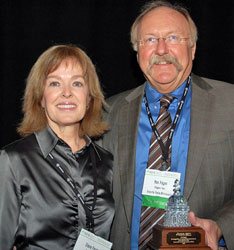The president of a company responsible for designing half the corn ethanol plants in the country is responding to comments attributed to him in the on-line publication of the Minnesota 2020, which describes itself as a “progressive, non-partisan think tank.”
 The opinion article was written by a college student from an interview done with Ron Fagen, president and CEO of Fagen, Inc., at the National Ethanol Conference in February. That’s where Ron and his wife Diane were recognized with the first ever Membership Award from the Renewable Fuels Association for their dedication of time, energy, resources and ideas in making the ethanol industry what it is today.
The opinion article was written by a college student from an interview done with Ron Fagen, president and CEO of Fagen, Inc., at the National Ethanol Conference in February. That’s where Ron and his wife Diane were recognized with the first ever Membership Award from the Renewable Fuels Association for their dedication of time, energy, resources and ideas in making the ethanol industry what it is today.
Editorial author Natalie Camplair notes Fagen’s contributions to the ethanol industry in the first paragraph, and then infers that Fagen has abandoned the industry he has helped to build over the last 20 years. “But the ethanol boom is over now,” she writes. “In an interview at the 2010 National Ethanol Convention on February 16 in Orlando, Florida, Mr. Fagen announced that, in 2010 and beyond, he plans to “put ethanol [projects] on hold” and instead to invest in biomass and wind energy projects.”
Back in the days when print only went as far as the paper on which it was published, this editorial would probably have only been read by a handful of people and Ron himself might never have even seen it. But, thanks to the internet, the story was re-published and linked around so it created enough waves that Mr. Fagen has circulated his own response:
A recent op-ed alleging that “the ethanol boom is over” and that “policies to further the corn ethanol industry should not be supported” demands a response, both because it is patently untrue and because my words were twisted and taken out of context to justify the editorialist’s opinion about corn ethanol. I respect that everyone is entitled to their own opinions. But, in the case of the op-ed titled “Beyond Corn Ethanol” published on April 28, 2010 by Minnesota 2020, neither the opinions nor the so-called facts expressed were accurate.
It’s true that Fagen Inc. has partnered with farmers to build more than half of all the ethanol plants in the U.S. It’s also true that technology innovations have enabled corn farmers and ethanol producers to become incredibly efficient stewards of resources. Today, corn farmers use fewer inputs and less energy on fewer acres of land to produce more bushels of corn than ever before. Case in point: in 2009, U.S. farmers planted 7 million fewer acres of corn than in 2007, but they produced more corn than in the previous record year of 2007 thanks to technology and yield increases. At the same time, ethanol plants have reduced energy and water use to become more sustainable and efficient. University studies indicate that one gallon of ethanol contains more than two times the amount of energy used to make it.
So it is not accurate – in fact, it is downright misleading – to suggest corn ethanol has no future. Today, ethanol-blended fuel is the most affordable and clean-burning alternative to gasoline. And more importantly, unlike some other promising alternative fuels, we don’t have to wait for more ethanol because it is here now as the only commercially viable substitute to fossil fuels. In fact, this year U.S. ethanol producers will rank as our nation’s third largest supplier of fuel on a gasoline-equivalent basis, behind only Canada and Saudi Arabia, and ahead of Venezuela.Read More
 The Environmental Protection Agency has designated Renewable Energy Group’s biodiesel plant in Newton, Iowa as the nation’s first “RFS2 Ready” RINs generating facility.
The Environmental Protection Agency has designated Renewable Energy Group’s biodiesel plant in Newton, Iowa as the nation’s first “RFS2 Ready” RINs generating facility.




 According to Oswald,
According to Oswald,  In the
In the 




